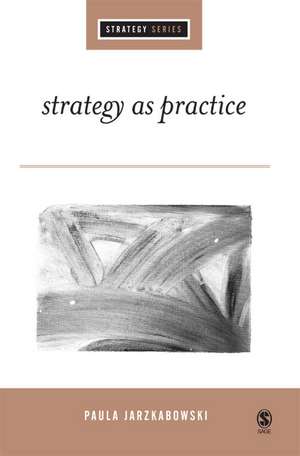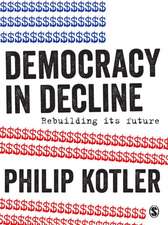Strategy as Practice: An Activity Based Approach: SAGE Strategy series
Autor Paula Jarzabkowskien Limba Engleză Paperback – 8 sep 2005
`Paula Jarzabkowski has astutely signaled an agenda for future scholarship that will no doubt fuel the continued growth of this subfield' - Organization Studies
`Pioneering work. As the first book in the new strategy-as-practice field, it offers readers both innovative models and exemplary field research' - Richard Whittington, Professor of Strategic Management, Said Business School, Oxford
'Extends and develops the emerging fields of strategy and practice as well as activity theory. It also demonstrates empirically, using University settings, how activity theory is itself bounded by the wider contexts of organisation, embedded routines and the heavy hand of history' - David C. Wilson, University of Warwick
`An insightful book that would be of use to people interested in the actual practices of strategy and strategizing' - Organization
Bridging the gap between what managers actually do and organizational strategies, this book provides an activity-based framework for studying strategy as practice, with empirical evidence to illustrate the dynamics of this framework in real terms.
Preț: 518.96 lei
Preț vechi: 610.54 lei
-15% Nou
Puncte Express: 778
Preț estimativ în valută:
99.30€ • 103.94$ • 82.65£
99.30€ • 103.94$ • 82.65£
Carte tipărită la comandă
Livrare economică 31 martie-14 aprilie
Preluare comenzi: 021 569.72.76
Specificații
ISBN-13: 9780761944386
ISBN-10: 0761944389
Pagini: 216
Dimensiuni: 156 x 234 x 12 mm
Greutate: 0.34 kg
Ediția:First Edition
Editura: SAGE Publications
Colecția Sage Publications Ltd
Seria SAGE Strategy series
Locul publicării:London, United Kingdom
ISBN-10: 0761944389
Pagini: 216
Dimensiuni: 156 x 234 x 12 mm
Greutate: 0.34 kg
Ediția:First Edition
Editura: SAGE Publications
Colecția Sage Publications Ltd
Seria SAGE Strategy series
Locul publicării:London, United Kingdom
Recenzii
'Given the book is the first to deal with 'strategy-as-practice' in depth, it becomes vital to set the contours of the field and lay the path for future research, both achieved in an admirable fashion. More importantly, it also raises several questions and forces the reader to embark on an invigorating thought process -the hallmark of an interesting book for the serious reader.'
Srinivas Gunta
IIMB Management ReviewReviews for Higher education Market:
'This volume will appeal to researchers, students and those engaged in
strategic management in higher education. The case study material
provides a detailed portrait of the ways in which senior managers engage
in strategic development. Overall, the volume provides rich insights on
strategic management in higher education'
-Professor Bob Burgess, Vice-Chancellor, University of Leicester
'This is a completely original account of three contrasting universities' approach to creating and managing strategy in modern conditions. The problem of multiple strategies which interact with one another will be recognised by every practitioner but have not been described in this way before." Strategy as Practice" represents an important contribution to higher education literature because it theorises decisions and strategies which are for the most part instinctive responses to external realities'
- Professor Michael Shattock was Registrar of the University of Warwick before taking up his Visiting Professorship at the Institute of Education, University of London, where he is Director of the MBA in Higher Education Management.
Overall, I found this book insightful and intriguing. As an interested
outsider, I appreciated the aim of the activity-based framework and its key
concepts. While I believe that many scholars will similarly recognize the
significance of the theoretical apparatus developed, the real value of the book
lies in the fact that it raises more questions than it answers. This is especially helpful in emerging areas of research, and in this case, Jarzabkowski has astutely signaled an agenda for future scholarship that will no doubt fuel the
continued growth of this subfield.
Jarzabkowski’s book is a welcome contribution and introduction to the emerging strategy-as-practice research community. Jarzabkowski has astutely signaled an agenda for future scholarship that will no doubt fuel the continued growth of this subfield.
Srinivas Gunta
IIMB Management ReviewReviews for Higher education Market:
'This volume will appeal to researchers, students and those engaged in
strategic management in higher education. The case study material
provides a detailed portrait of the ways in which senior managers engage
in strategic development. Overall, the volume provides rich insights on
strategic management in higher education'
-Professor Bob Burgess, Vice-Chancellor, University of Leicester
'This is a completely original account of three contrasting universities' approach to creating and managing strategy in modern conditions. The problem of multiple strategies which interact with one another will be recognised by every practitioner but have not been described in this way before." Strategy as Practice" represents an important contribution to higher education literature because it theorises decisions and strategies which are for the most part instinctive responses to external realities'
- Professor Michael Shattock was Registrar of the University of Warwick before taking up his Visiting Professorship at the Institute of Education, University of London, where he is Director of the MBA in Higher Education Management.
Overall, I found this book insightful and intriguing. As an interested
outsider, I appreciated the aim of the activity-based framework and its key
concepts. While I believe that many scholars will similarly recognize the
significance of the theoretical apparatus developed, the real value of the book
lies in the fact that it raises more questions than it answers. This is especially helpful in emerging areas of research, and in this case, Jarzabkowski has astutely signaled an agenda for future scholarship that will no doubt fuel the
continued growth of this subfield.
Jarzabkowski’s book is a welcome contribution and introduction to the emerging strategy-as-practice research community. Jarzabkowski has astutely signaled an agenda for future scholarship that will no doubt fuel the continued growth of this subfield.
Cuprins
Introduction
Strategy as Practice: A New Perspective
DEFINING AND THEORETICALLY LOCATING AN ACTIVITY-BASED VIEW
Core Social Theory Themes in Strategy as Practice
Locating Activity in the Strategy Literature
SHAPING STRATEGIC ACTIVITY IN PRACTICE
Establishing the Research Context
Implications of Procedural and Interactive Strategizing
Shaping Strategy and the Strategizing Matrix
Multiple Strategies Shape Each Other
THEORIZING AN ACTIVITY-BASED VIEW OF STRATEGY AS PRACTICE
Developing a Strategizing Framework
Taking the Research Agenda Forward
Strategy as Practice: A New Perspective
DEFINING AND THEORETICALLY LOCATING AN ACTIVITY-BASED VIEW
Core Social Theory Themes in Strategy as Practice
Locating Activity in the Strategy Literature
SHAPING STRATEGIC ACTIVITY IN PRACTICE
Establishing the Research Context
Implications of Procedural and Interactive Strategizing
Shaping Strategy and the Strategizing Matrix
Multiple Strategies Shape Each Other
THEORIZING AN ACTIVITY-BASED VIEW OF STRATEGY AS PRACTICE
Developing a Strategizing Framework
Taking the Research Agenda Forward
Descriere
For higher Ed market:
The basis of this book is an in-depth empirical study of strategy and strategizing in universities. It provides insights into how strategies of research, teaching and commercial income are shaped over time, as well as considering the problems of size and scope faced by modern universities. Theoretically, the study is robustly framed within the strategy literature, while the detailed empirical analysis makes a clear contribution to our understanding of putting strategy into practice in both the university and wider contexts. Many practical stories and exhibits about doing strategy in universities are included that will be evocative and thought-provoking for those researching, studying or managing higher education institutions. With its unusual combination of a strong strategy framework and rich empirical insights into strategizing in universities, this book is of interest to students of higher education management, as well as to practising managers in higher education.
'This volume will appeal to researchers, students and those engaged in
strategic management in higher education. The case study material
provides a detailed portrait of the ways in which senior managers engage
in strategic development. Overall, the volume provides rich insights on
strategic management in higher education'
-Professor Bob Burgess, Vice-Chancellor, University of Leicester
'This is a completely original account of three contrasting universities' approach to creating and managing strategy in modern conditions. The problem of multiple strategies which interact with one another will be recognised by every practitioner but have not been described in this way before." Strategy as Practice" represents an important contribution to higher education literature because it theorises decisions and strategies which are for the most part instinctive responses to external realities'
- Professor Michael Shattock was Registrar of the University of Warwick before taking up his Visiting Professorship at the Institute of Education, University of London, where he is Director of the MBA in Higher Education Management.
'Strategy is something all organizations are encouraged to have. Many that do get it wrong. Their strategies are empty black box 'diamonds' or other modish schemes. In this book Jarzabkowski argues, cogently, that strategy should be seen in terms of practice - in terms of what it is that organizations and strategic actors do when they do strategy. The book signals a major re-orientation and intellectual maturation of a field that is too important for organizations to leave to the odd blend of occasional scholarship, analysis based on aggregate data, and inspired prescription that has characterized much of strategy to present. In addition, it charts how organizations in one of the most important institutional areas of contemporary societies, the universities, actually do strategy'
Stewart Clegg, University of Technology, Sydney, Australia
'This volume will appeal to researchers, students and those engaged in
strategic management in higher education. The case study material
provides a detailed portrait of the ways in which senior managers engage
in strategic development. Overall, the volume provides rich insights on
strategic management in higher education'
-Professor Bob Burgess, Vice-Chancellor, University of Leicester
'This is a completely original account of three contrasting universities' approach to creating and managing strategy in modern conditions. The problem of multiple strategies which interact with one another will be recognised by every practitioner but have not been described in this way before." Strategy as Practice" represents an important contribution to higher education literature because it theorises decisions and strategies which are for the most part instinctive responses to external realities'
- Professor Michael Shattock was Registrar of the University of Warwick before taking up his Visiting Professorship at the Institute of Education, University of London, where he is Director of the MBA in Higher Education Management.
'Strategy is something all organizations are encouraged to have. Many that do get it wrong. Their strategies are empty black box 'diamonds' or other modish schemes. In this book Jarzabkowski argues, cogently, that strategy should be seen in terms of practice - in terms of what it is that organizations and strategic actors do when they do strategy. The book signals a major re-orientation and intellectual maturation of a field that is too important for organizations to leave to the odd blend of occasional scholarship, analysis based on aggregate data, and inspired prescription that has characterized much of strategy to present. In addition, it charts how organizations in one of the most important institutional areas of contemporary societies, the universities, actually do strategy'
Stewart Clegg, University of Technology, Sydney, Australia



















